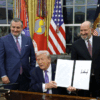A main goal of Obamacare was to expand health care coverage in the United States, which it tries to achieve largely by adding 18 million more individuals to Medicaid. But health coverage does not always equate to access to care, which is already apparent in the Medicaid program. In light of an increasing physician shortage across the nation, the changes made by Obamacare will make it even harder for Medicaid beneficiaries to receive primary care.
Medicaid patients already face an uphill battle trying to find physicians, since the program pays providers significantly less than private insurers and even Medicare. In many cases, reimbursement does not even cover the cost of providing services. Meanwhile, the Association of American Medical Colleges predicts a shortage of 45,000 primary care physicians and 46,000 surgeons and medical specialists within the next 10 years. As the population ages, demand for health care providers will rise.
A recent study by the Center for Studying Health System Change (CSHSC)looked at the effects of the large influx of new Medicaid patients on access to primary care physicians (PCPs). It concluded, “Medicaid PCP supply will likely increase the most in states that already have the largest PCP supply relative to the Medicaid population, while shortages of PCPs for Medicaid enrollees are likely to grow even worse in states that already have low Medicaid PCP supply.”
In an attempt to address Medicaid beneficiaries’ difficulty in finding care, Obamacare increases federal Medicaid reimbursement rates for primary care to match those of Medicare for two years. But this temporary fix will not solve the long-term problem.
Moreover, the CSHSC found that “states that currently have the fewest number of PCPs relative to the population—primarily in the South and Mountain West—already have Medicaid reimbursement rates close to or exceeding Medicare rates and, therefore, will see relatively little impact from the increased Medicaid reimbursement rates.”
Jessica Marcy writes for Kaiser Health News that these states “could struggle to provide medical services to the surge of new patients expected to enroll in Medicaid under the health overhaul and federal incentives may not provide much help.” CSHSC’s Alwyn Cassil drives home the point: “If you thought the increased Medicaid reimbursement was going to get a lot more docs to jump in and be willing to take on new Medicaid patients, it’s not going to work that way.”
Rather than expand a broken system, Congress should have acknowledged that the program is not structurally sound. It already places an untenable financial burden on states and does not pay providers enough, resulting in low-quality care for those who depend on it. Unfortunately, Obamacare does not provide a permanent solution to these serious problems, instead exacerbating them.
This post was co-authored by Meera Yogesh. Yogesh is currently a member of the Young Leaders Program at The Heritage Foundation. For more information on interning at Heritage, please visit: http://www.heritage.org/about/departments/ylp.cfm
































4 Replies to “Side Effects: Obamacare and a Physician Shortage Mean Reduced Access to Care Under Medicaid”